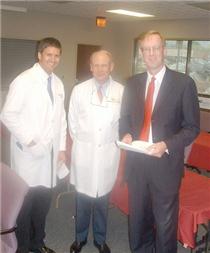
Announcing new robotic surgical equipment at Parkridge Medical Center were, from left, Dr. Rob Headrick, Dr. Andrew Rittenberry and CEO Niels Vernegaard. Click to enlarge.
photo by John Wilson
A new robotic-assisted da Vinci Surgical System(tm) at Parkridge Medical Center will soon be drastically reducing patient
recovery time - even on complex surgeries, Parkridge officials said Thursday.
Parkridge is the first hospital in the region and the second in Tennessee to aquire a breakthrough in medical technology, the da Vinci system that "enables surgeons to use robotics in the operating room to perform minimally invasive surgical techniques with greater precision than ever before."
"Robotic-assisted surgery is one of the most important and exciting
medical breakthroughs of our time," said Niels Vernegaard, president and
chief executive officer of Parkridge Medical Center.
"This equipment will increase and improve treatment options for our patients and enable Parkridge surgeons to work with the most revolutionary tools available."
Parkridge Medical Center's new da
Vinci system will be used in surgical procedures that are performed through small openings rather than long incisions and often include the
use of a tiny video camera, similar to the one used in laparoscopic
surgery. Minimally invasive surgery has grown over the past decade
because patients benefit from the smaller incisions, less injury to
surrounding tissues, and lower risk for wound infection, officials said.
"The availability of robotic technology at Parkridge is a tremendous asset to surgeons and patients alike," said Parkridge Medical Center's Medical Director of Robotics Surgery Andrew Rittenberry, a general surgeon with University Surgical Associates.
"Nationwide success stories include a
woman who had a hole repaired in her heart and was out of the hospital in
a day," he said.
Dr. Rittenberry said training by physicians and staff on the new equipment will begin at the end of the month and its first use should be about a month after that.
Officials said the equipment cost about $1 million.
The first da Vinci system was used in July of 2000, and today there are
fewer than 100 in operation across the country. Complex cardiology and
urological surgeries are where the instrument is showing the most promise
to patients. Each of these surgeries has traditionally required large
incisions and extended recovery time, but with the advent of the da Vinci system, both incisions and hospital stay have been greatly minimized.
Already approved by the FDA for certain specific chest surgeries, such as IMA harvesting (taking the mammary artery for use in a bypass operation), FDA-sanctioned cardiac clinical studies are now underway for Mitral Valve Repair, Atrial Septal Defect closure, and Coronary Artery Bypass surgery.
"The da Vinci System holds great promise for patients who need bypass
surgery," said Dr. Rob Headrick, a cardiothoracic surgeon affiliated with
the Alliance of Cardiac, Thoracic and Vascular Surgeons. "Heart disease
is the leading cause of death in the United States, and coronary artery
bypass grafting or "CABG" is the most commonly performed heart operation.
Traditionally, heart bypass surgeries require a large 8- to 10-inch incision through the chest wall. In contrast, surgeons using the robotic surgery system to perform a totally endoscopic coronary artery bypass (TECAB) perform the surgery through only three or four pencil-sized holes - or "ports" - between the ribs. Through these ports, two robotic "arms" and a camera system gain exposure to the heart, allowing the surgeon to perform surgery without opening the chest."
Use of the da Vinci system also holds great promise for men in need of
complex urological procedures, such as removal of the prostate. "Prostate
cancer is the second leading cause of cancer death in men," said Dr.
Patrick Foley, urologist. "Prostate removal surgeries are usually
performed through large, open surgical incisions, which often result in lengthy and somewhat uncomfortable patient recovery. Additionally, there is a significant risk of impotence and incontinence as a result of the surgery. Now with the da Vinci robotic system, surgeons will be able to operate with precision and offer patients a decreased hospital stay, less
pain, fewer side effects, and a quicker recovery after surgery."
While seated at a console a few feet away from the patient, a surgeon
using the da Vinci system views a three-dimensional image of the surgical field and controls the electro-mechanically enhanced instruments through tiny ports. The technology seamlessly translates the surgeon's movements into precise, real-time movements of the instruments actually operating on
the patients.
Traditional laparoscopic surgery uses two-dimensional imaging, and the
movement of instruments is counter-intuitive-similar to looking into a
mirror. With nearly all of the natural movements of a human wrist, the robotic system eliminates natural hand tremors and improves dexterity to enable surgeons to do ever-finer surgery in a more controlled environment, it was stated.
"Our patients' health and the quality of their treatment are our primary focus here at Parkridge," said Vernegaard. "The technological
advancements we've made with the installment of the robotic system
reinforce that commitment as we continue to be at the forefront in the
next generation of surgical procedures."